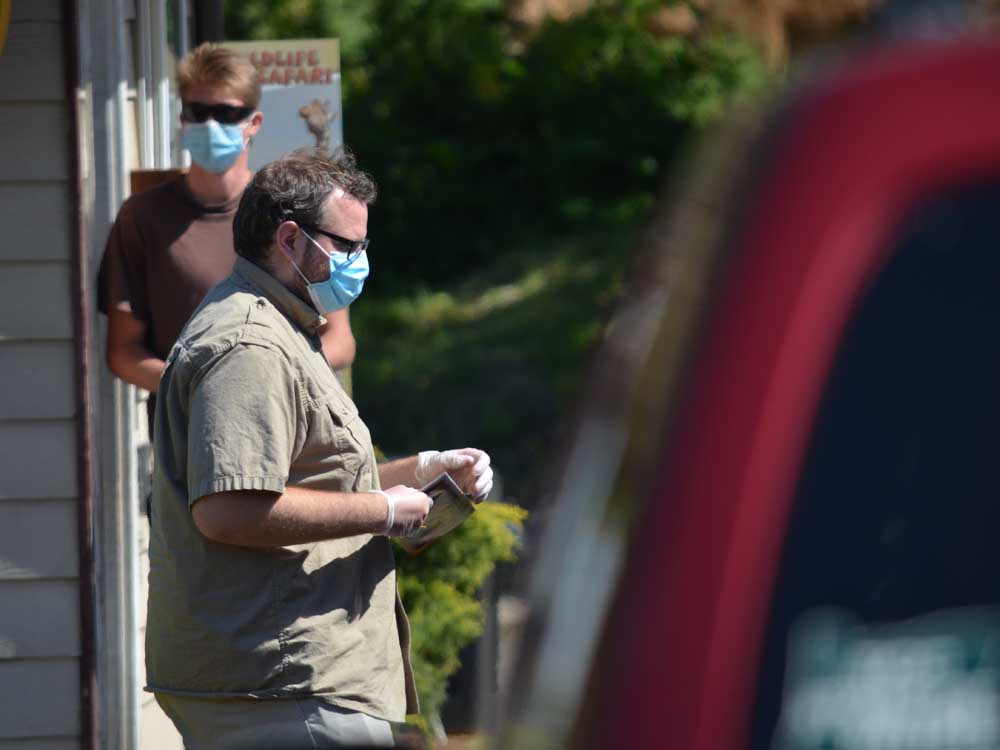Despite lockdown, people flock to Wildlife Safari
Published 2:00 pm Wednesday, May 13, 2020

- Shelby Schalub, front, and Garrett Tischner work the entrance to the drive-thru portion of Wildlife Safari in Winston on Wednesday. The drive-thru portion of the park has remained open during the coronavirus pandemic.
WINSTON —
Dan Van Slyke couldn’t help but smile when he talked earlier this week about a recent resurgence of Wildlife Safari.
“No doubt about it, we’re saving people’s lives,” said the executive director of the nearly 50-year-old drive-thru animal preserve.
To be clear, Van Slyke wasn’t talking about something like a cure for COVID-19, the disease caused by the coronavirus that started a pandemic. He was talking about how his park is providing a cure for sheer boredom, which arguably became just as contagious as the epidemic, thanks to the social distancing and shelter-in-place orders put into place around the world.
“If you’re in Portland and you’re stuck in a house and you’re going crazy, you can come down here,” he said. “We’re saving lives of kids; we’re saving marriages. This is all about mental health. That’s what we’re doing.
“I had a guy at Costco ask me if my business was essential. I looked at him and said, ‘Ya think?’”
The park, which opened in 1972, is the only drive-thru animal park in Oregon and the only open-air animal park on the West Coast that’s still open. Park officials have embraced the park’s traditional sales pitch of “you are captive, they roam free” as if it was made for a once-in-a-century pandemic.
Van Slyke, at one point, when Gov. Kate Brown originally issued her “Stay Home, Stay Healthy” order in March, wanted to close the park since many were under the impression that everyone needed to remain indoors. Park officials did an about-face on that decision not long afterward, opting to keep the drive-thru open while closing the free-of-admission Safari Village.
But as time progressed, the park opened up without fully opening up. Merchandise from the gift shop was brought out into the open and put for sale under a canopy tent, and anyone working the booth is required to wear gloves. On Wednesday, Shelby Schalub and Garrett Tischner, who were working the kiosk at the front of the drive-thru park, each wore masks and gloves. And for a couple of weekends, food was being prepared and served outside of the shuttered gates to the Safari Village.
Just the drive-thru portion of the park, however, was good enough. Jacob Schlueter, the marketing director for the park, said the park broke single-day attendance records, with cars extending from the front gate of the 600-acre park past the turnoff at NW Lookingglass Road near state Highway 42 — a distance of almost 2 miles. Park attendees, some of whom drove in from as far as Washington and California, reached more than 4,000 on one day, Van Slyke said.
“We had people who were waiting for more than an hour and a half to get into the park, and I can’t think of one person who complained,” he said.
Brown’s announcement last week for phase-by-phase reopening of Oregon’s businesses forced the park to change plans again, however. Schlueter said even though some of the park’s animal encounters have reopened — private and small-group sessions with park staffers and park patrons are still available — many large-group encounters that included groups of 100 or more won’t be available since the governor’s order isn’t allowing groups of 25 or more until September.
Park officials also decided to open up Safari Village on May 1, with only takeout style orders available. Enclosed spaces within the village are closed along with the village’s playground, to remain in compliance of Douglas County’s current social-distancing restrictions regarding park usage. Schlueter also said for those who are in the village, there’s two or three staff members who are assigned to keep watch and ensure people aren’t grouped too close together.
“There’s a lot of stuff we’re doing that’s still kind of a work in progress,” Schlueter said.
Van Slyke feels that’s OK, though, since the park has survived the uncertainty from the beginning of the pandemic to become an all-but-certain destination for animal lovers.
“We actually fielded calls from people in the first week thinking they were breaking the law if they left their house, so it was like a ghost town here that first week,” he said. “They were scared to come here. Then after a little while, they realized there was a place they could actually go to nearby so they could keep some of their sanity.”






